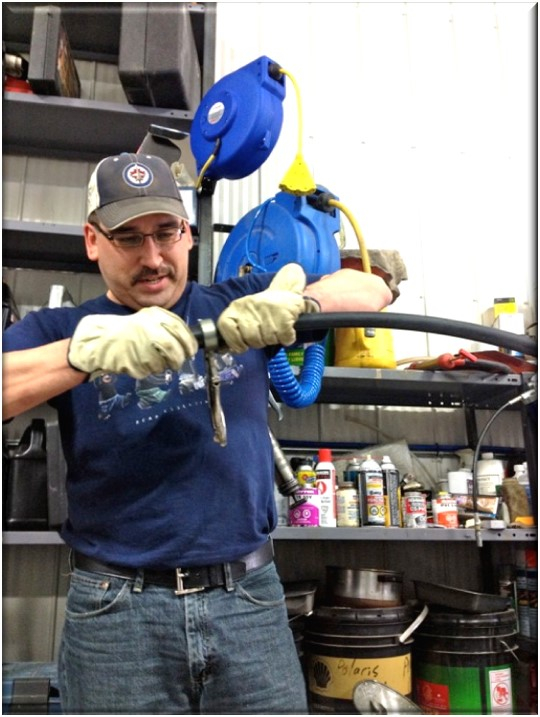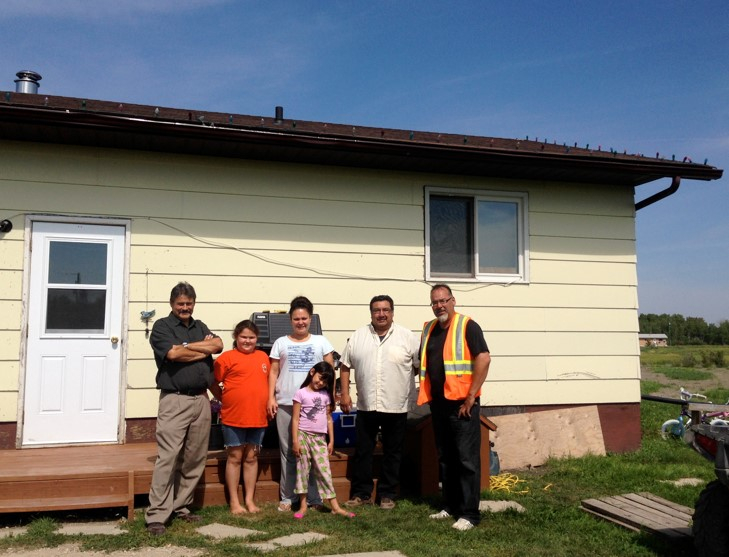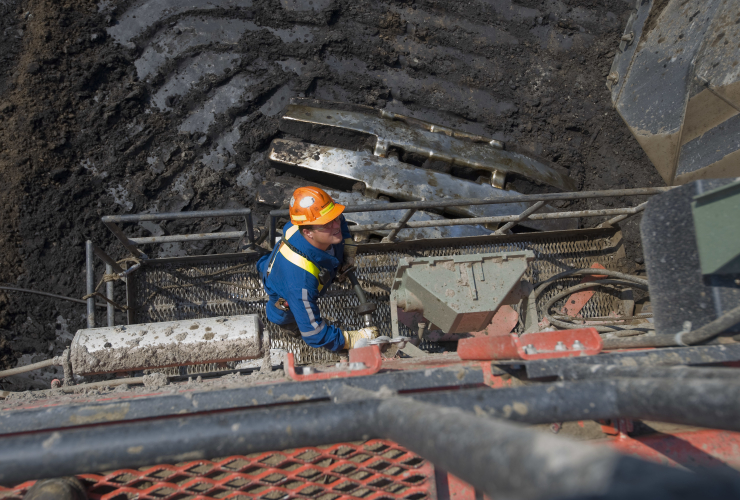Bolder, faster, together poses the question: How can we all take responsibility for the past, navigate a turbulent present and co-operate to protect future generations? Follow along as this series, co-ordinated by the Transition Innovation Group at Community Foundations of Canada, explores the deep societal transformation already underway and accelerating in Canada and around the world.
When we co-founded Aki Energy in 2013, we would never have guessed that nine years later, we would be in a position to lead an energy transition in our home province of Manitoba.
Aki Energy is an award-winning First Nations social enterprise that has already installed 500 ground source heat pumps on Manitoba First Nations. Aki (pronounced A-kee) is an Anishinewmin (Oji-Cree) word meaning Earth, which turned out to be an appropriate name, given the technology is very Earth-friendly and we’ve installed 200 kilometres of loop in the ground.
Ground source heat pumps (often called “geothermal” on the Prairies) move heat from below the frost line in the winter and dump it into a house or building. When we describe the operation of the systems to residents, we use the example of a refrigerator that removes heat from inside the fridge chamber and dumps it into the kitchen.
The systems work in reverse in the summer, taking heat from the house and dumping it into the ground. On a hot Prairie day shortly after his heat pump was installed, an Elder who had never before had air conditioning excitedly called the band office in gratitude and left a message: “It’s so cool, you could hang meat in here!”
Overall, the annual electricity consumption in these homes has fallen by nearly 50 per cent.

The environmental and affordability benefits are key, but what gets us really excited is the job creation. Aki Energy has trained and hired more than 55 First Nations workers to install these systems. We used the opportunity to accomplish what we believe to be Canada’s defining issue: connecting the people who most need the work with the work that most needs to be done.
We began by training and certifying First Nations people in a specially designed course to ensure success. Our co-workers gain valuable skills in plumbing, electrical, heavy equipment operation and HVAC — great entry-level work for careers in the trades.
The recipe for our success has five ingredients. Municipalities and cities should take note, as lessons learned apply in their urban contexts as well.
Firstly, don’t expect people to pay more upfront. We arranged to have the upfront costs financed through Manitoba Hydro. The utility attaches a fee to each retrofitted home’s electrical bill, usually about $80 a month, collected until the upfront money is paid back. Because the energy bill reductions are larger than the fee, the net bill is lower.
Secondly, we negotiated bulk purchases with equipment suppliers to drive down the capital costs and drive up the quality. Rather than going for cheap, we buy value: high-quality equipment with excellent efficiency ratings and good warranties.
Thirdly, we built government and utility incentives into the back end rather than after the fact. It reduces administration and makes our offering clean and simple. Manitoba Hydro pays an incentive for people who install ground source heat pumps.
Fourthly, using this utility approach, we are able to go to the houses where ground source heat pumps make financial sense. We choose homes with yards large enough to install the loops and where the soil isn’t too rocky or too sandy. Houses that aren't ideal can be retrofitted later with other technologies such as air-to-air heat pumps or biomass, but for us, we focus on low-hanging fruit to ensure financial viability.
Lastly, we train new workers and make sure the systems are installed properly. We’re no fly-by-night operation. Each community we work in is invited to appoint a representative to our non-profit board. Our financials are available to our partners. First Nations feel we are a part of their community rather than the usual — contractors coming in from the outside, installing equipment that is low-quality and leaving no capacity in the community to maintain the systems to ensure their long-term viability.
We came up with the recipe by stepping back and looking at how other energy transitions have taken place. We asked ourselves, “How the heck did the natural gas industry manage to connect to 99 per cent of the buildings in our home city of Winnipeg?” They made their product the “ordinary.” In other words, a standard way of doing things. They marketed the benefits and installed the infrastructure (natural gas pipelines), inviting people who wanted to connect to their infrastructure to pay a monthly fee.
Many renewable heating options are already more cost-effective on a life-cycle basis than business-as-usual fossil fuel options. But market penetration is low because building owners are being asked to pay one-off prices, fork out all the upfront costs of the renewable option and apply for complicated incentives after the fact. Governments would do well to shift their incentives from individual installations towards supporting business models that make rapid market penetration possible and achieve the associated cost-reductions that come with scale.
We estimate there are 10,000 houses on First Nations in Manitoba that are a great fit for Aki Energy’s approach — a $250-million market, half of which would be to pay for on-reserve labour. To make this a reality, we are partnering with Raven Indigenous Capital Partners, which in turn is negotiating with governments to ensure Aki Energy will be compensated for all our outcomes, including the benefits of employment, reduction in social assistance costs (we hire people who are currently unemployed) and carbon benefits, too. Using this approach, governments are net financial beneficiaries as they can pay out of the savings generated. This is what reconciliation looks like to us — scaling First Nation solutions that work.
As for our home city of Winnipeg, we’d like to see Aki Energy’s magic available here, too. Instead of heat pumps being the exception to the rule, make them the ordinary way of doing things. We make heat pumps cost-competitive, or even cheaper, both in one-time, upfront costs and monthly operating costs. To achieve this, the municipality can use its natural advantages to offer low-cost financing, use the same authorities that install sewer and water pipes to install geothermal loops, negotiate discounts with industry and ensure contacts go to companies that are training workers who currently don’t have access to the labour market.
The energy transition we all want won’t be achieved until we make it ordinary, and Aki Energy has the recipe to do just that.
Darcy Wood is former Chief of the Garden Hill First Nation and currently the CEO of Aki Energy. Wood is the 2020 recipient of the Canada Clean50 Award for Outstanding Contributions to Clean Capitalism.
Author of An Army of Problem Solvers, Shaun Loney is an Ashoka Fellow, EY Entrepreneur of the Year and Co-Founder of several social enterprises including Aki Energy. He’s currently running for Mayor in Winnipeg.
Great news, send them to
Great news, send them to Alberta! We are stuck in a fossilized fossil fuel environment here. BUT, electricity is 4 x the price of Manitoba as I paid my electricity bill for our cottage for 50 years
Canada needs (literally) a
Canada needs (literally) a hundred of these companies. And they need better excavators so they can dig anywhere.
Air-to-air heat pumps may be enough on the coasts, but we'll have to dig all through the prairies and the North.







Comments